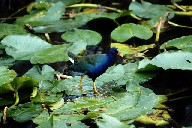|
ECO-PROS
Environmental Education on the
Web
WETLANDS RESOURCES
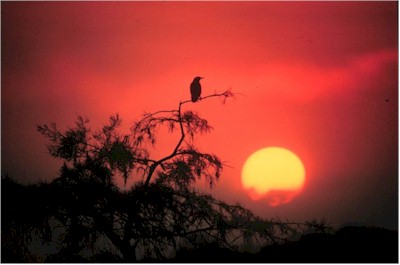
"Sunrise Over the Everglades"
Courtesy of NOAA. Photographer: Richard Frear
|
Also see links to
online resources related to wetlands on our other Wetlands pages,
specifically regarding Types of Wetlands, Wetlands Loss, and
Wetlands Recovery. |
Wetlands
Systems and Subsystems Classifications
-
Wetlands Education System (Purdue Univ)
Click into each of the 5 classifications of wetlands:
Marine, Estuarine, Lacustrine, Riverine and Palustrine.
Within each classification you will find underlined hyperlinks to descriptions
of typical examples of those types of wetlands.
|
| Fresh
Water Ecosystems
from the Missouri Botanical Gardens
|
An
Introduction to Estuaries
from the National Estuarine Research Reserve System
Estuaries - endangered ecosystems! Estuaries are partially enclosed bodies of
water formed where freshwater from rivers flows into the ocean and mixes
with salt water. Many different habitat types are found in and around
estuaries. Estuaries are among the most organic productive environments on
earth, supporting a wonderful abundance of plants and animals.
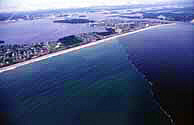
Inlet where salt water meets fresh water
Notice the difference in the colors of the water
Credit: South Florida Water Management District |
Wetland
Kids - Allow time for photos of
wetlands to load on various pages
Sections: What is a Wetland?, What Wetlands Do For You, What Can
You Do!, Find a Wetland Near You, Did You Know, Wetland Words,
Activities, Links
|
Wetlands
Education System Graphics (Purdue University)
Pictures showing aquatic plantlife in various types of wetlands
|
Wetlands
(Environmental Protection Agency)
"To encourage and enable others to act effectively in protecting and restoring the nation's wetlands and
associated ecosystems." Site has information on wetland planning, management, and
pollution prevention; facts about monitoring wetlands; information
resources, facts, laws, and a hotline.
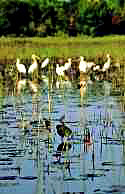
Wetlands life support system
Credit: South Florida Water Management
District
America's
Wetlands (Environmental
Protection Agency)
Learn about America's rich variety of wetlands, their importance, how they are threatened, and what can be done to conserve them for future
generations.
|
What’s a wetland anyway, and why are they so important to protect?
(Audubon)
Duke
University Wetland Center
Take the Everglades Field Trip and read how the increasing human population has affected the Everglades ecosystem for more
than 100 years. Also review the Wetland Links page for resources around
the world. |
The Pantanal (Waterland
Research Institute)
Earth's largest freshwater wetland system, The
Pantanal, is one of the most pristine and biologically rich
environments on the planet.
The Time to Save the Pantanal is Now
(Conservation International)
Located at the crossroads of Bolivia, Brazil, and Paraguay, south of
the Amazon basin, The Pantanal has already lost a staggering 17
percent of its original vegetation. Conservation International
warns this immense wetland system may disappear by 2050. |
Center
for Aquatic and Invasive Plants and the Aquatic, Wetland and Invasive Plant
Information Retrieval System (APIRS) -
From the University of Florida. The world's largest database information resource of its kind,
images of aquatic birds, animals, and plants, aquarium/water garden resource
guide, links to relevant web sites.
Invasive plants are plants that are not natural to the area as they have come
from other ecosystems. The invading plants disrupt the natural habitat and
can cause great harm to native plants and animals. Read about the Invasive Nonindigenous Plants of Florida
and find out why they are harmful to Florida's forests and wetlands. |
Aquatic Environments of Canada
Habitats,
Animals, and Plants of Lakes, Ocean, Rivers and Wetlands
Discover Canada's Wetlands
Information on just about every aspect of wetlands. |
National
Wetlands Inventory Center
Information
about the characteristics, extent and status of the Nation's
wetlands and deepwater habitats. Wetland curriculum guides,
kids pages, and links to other related resource sites.
Wetlands Mapper -
See a map of wetlands near you.
Just
for Kids - Shorebirds and Wetlands
(U.S. Fish
and Wildlife Service) |
|
Wetlands in the Great Lakes Region |
California
Wetlands Information System
State and
Federal
information is provided on wetlands ecosystems
California Environmental Resources
Evaluation System (CERES) |
|
Wetlands
Across Australia |
LaCoast - Louisiana coastal and wetlands
information
Approximately 40 percent of the
coastal wetlands of the lower 48 states is located in Louisiana.
This fragile environment is disappearing at an alarming rate.
Louisiana loses one acre of land every 35 minutes! The
"Hurricane Information Center" section contains photos, scientific
data, reports, and downloadable posters pertaining to the Katrina
and Rita hurricanes that have done so much damage.
Click on "Geography" for a clickable map of Louisiana's coastal
wetlands. Click on each one for specific information.
The "Education" section offers free publications, brochures,
teacher's guides, and CD-ROMs. See what the status is on
restoration projects |
Prairie Wetlands are Important for Carbon Storage
(Northern Prairie Wildlife Research Center) |
National
Wetlands Conservation Alliance
Links to resources |
Wetlands
and Clean Water
Reports, fact sheets, current
news and resource links
Sierra Club's Wetlands
Restoration Program |
Learn more about Flamingos from Sea World
(move through their links at bottom of their pages) |
| Society
of Wetland Scientists
- List of links to wetland related websites |
|
Lost
Wetlands - Resource links to
wetlands information |
Estuaries
- From the National Institute of Water and
Atmospheric Research - New Zealand
(wait for page to fully load)
Estuaries are one of the most productive ecosystems on
Earth. See illustrations of different types of
estuaries. Read about how estuaries are formed, nutrient
recycling, the estuarine food web, and the ecological value of
these unique habitats. |
|
Lawrence Elementary School Wetland Project and Outdoor Classroom
(No. Battleford, Canada) |
|
 |
Millions of birds
that migrate thousands of miles must have wetlands along the way
to provide them with the energy sources
they need to continue their migration.
It looks
like our Canada Goose has found what he was searching for -
a
wetland! |
|
|

USFWS/Wyman Meinzer
Canada Geese
|

USFWS
Migratory Bird Flyways
|

USFWS/Dick Bailey
Alligator
|

USFWS/Randy Lennon
American Beaver
|
|
Click
on these images for a closer view, but don't disturb the residents!
More wetland photo links are on our main Photos page and below. |

WETLANDS
ACTIVITIES:
Find wetlands
on maps. Look up information on different kinds of wetlands.
Are they
saltwater, freshwater or a mixture of both?
Are there dry
periods and flood periods, or is there water yearlong?
What kind of
plant life inhabits the different wetlands and their surrounding areas?
What animals
are dependent upon the different wetlands?
Do people live
near the wetlands? Do they live in harmony with the natural
ecosystems?
What is being
done to preserve our wetlands?
Is anything
being done locally that you and your family could help out on?
Remember that question on
our Third from the Sun page?
"How should wetlands be changed to make
them more useful?"
Now that you have learned more
about wetlands and their ecosystems, you probably feel as we do:
|
The issues
related to Wetlands and land use are
very complex, but we are understanding more and more about their crucial
functions in our global ecosystem
and beginning to restore and enhance wetlands instead of
destroying them.
Wetlands should remain in
their natural state in support of plants and animals,
and to provide the
many crucial functions that benefit the environment and humanity.
Wetland habitats need to be restored, and not changed, converted or destroyed. Wetlands are
natural resources that must be preserved, enhanced and protected.
|
|
Wetlands
Photos Pages
|
1 |
2 |
| Takes about 1 1/2 minutes over a
56K |
NOTE: Permits are
required to make changes to wetlands. Unlawful destruction of wetlands
violate the Clean Water Act. See report on first judicial case on unlawful
destruction of wetlands settled in federal court.
Capitol
Reports (2/2/00)
|
|
WETLANDS AND WATERWAYS ISSUES IN THE NEWS
.gif)
|
"COURT TAKES UP
LANDMARK WETLANDS CASE"
(Associated Press
article on Yahoo! News, Oct 11, 2005)
"The Supreme Court set the stage Tuesday for what
could be a landmark ruling on government authority to regulate wetlands and
control pollution, giving new Chief Justice John Roberts his first chance to
limit federal regulation of property rights." |
FARMING
ACTIVITIES SUBJECT TO ENVIRONMENTAL REGULATIONS
A California rancher has been fined $1.5 million civil fine
for deep plowing drainages and a vernal pool. Court found
that deep plowing, also called deep ripping, "can constitute a point source of pollution within the framework of the Clean Water
Act." The rancher has been given the option of
paying the full fine or paying $500,000 and restoring four acres of wetlands.
Sacramento
Bee (By Denny Walsh, Bee Staff Writer
8/16/01) |
ONE
OF WORLD'S RICHEST WILDLIFE HABITATS IN JEOPARDY
The Pantanal wetlands region in southwest
Brazil is the largest wetland in the world. It is an
enormous freshwater ecosystem already at risk from intensive
development, pollution and siltation. Now an even greater
threat looms from a proposed project to straighten curves and
dredge channels of the Pantanal's rivers for deep-water
navigation, which will change the natural water flow and
accelerate drainage of the wetlands. We need only think of
what has happened to the Everglades from human re-engineering of
nature, to foresee what disastrous environmental consequences (for
both humans and wildlife) come from misguided
"re-plumbing" of natural wetlands.
CNN
(3/5/01)
Conservation
International
The Pantanal Expedition (involved 30 scientists from 5 different
disciplines)
AquaRAP - rapid assessment of priority sites around the world
Major threats to the Pantanal and conservation recommendations
The
Nature Conservancy
-
Basic facts and threats to the Pantanal
Picture
of the Pantanal wetlands |
ENVIRONMENTAL
ETHICS
AND GOVERNMENT
ACCOUNTABILITY
Jeff Ruch, executive director of PEER,
talks about freedom of speech and the integrity of public
agencies and their employees charged with the responsible
management of America's public resources and the
protection of the environment.
Grist
Magazine
(12/12/00)
PEER
(Public Employees
for Environmental Responsibility)
Protecting government employees who are protecting our
environment against exploitation and pollution of our
environment. |
|
"Pentagon
Rebukes Army Corps"
Manipulation and bias cited in investigative report.
Washington
Post
(12/7/00) |
Redemption
at hand...
"The Everglades restoration bill provides a great opportunity to turn the Army Corps
of Engineers from a force at war with nature to an ally in restoring
it." "We've committed to
correcting some of the worst environmental mistakes of our past and to shaping a future where the needs of people and nature coincide."
- Mark Van Putten, President/CEO National Wildlife Federation.
NWF
(11/3/00) |
More
on the Corps...
"We were outraged to discover the Corps’ willingness to
skirt the law for a
scientifically-flawed proposal”
"A series of recent articles by the Washington Post
demonstrates that this sort of complicity
on the part of the U.S. Army Corps of Engineers is a regular
occurrence in some regions of
the country. This behavior is not what Congress intended when
environmental laws were
passed, and we intend to make sure this practice is stopped,”
ENN
(10/5/00) |
Special Report
on
U.S.
Army Corps of Engineers (Washington Post)
Links to five-part series below. Many other links to
articles and information surrounding allegations and controversies
are contained within the various articles.
Proposal
blocked to force the Corps to adopt higher environmental
standards.
Washington
Post
(9/22/00)
|
Click on
the lily pad walker to go to the Third from the Sun page
or visit one of the links below
|









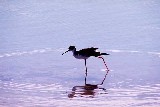
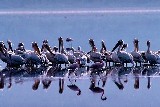
.gif)
